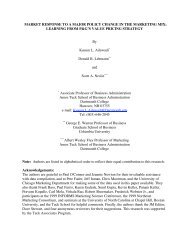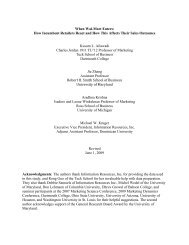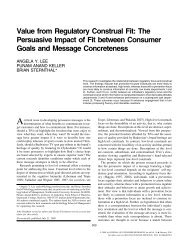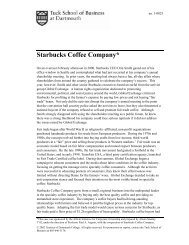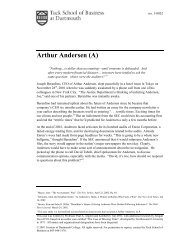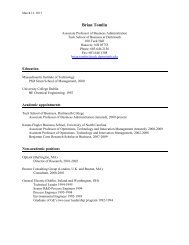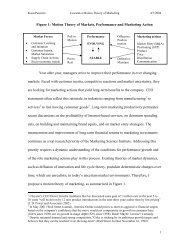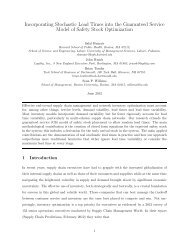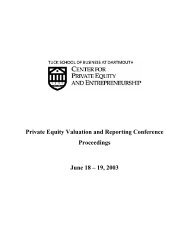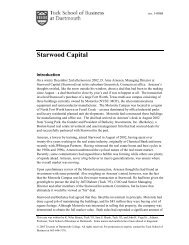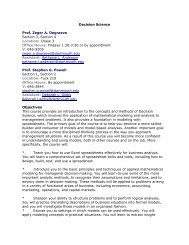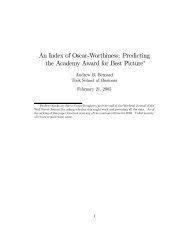tax notes international - Tuck School of Business - Dartmouth College
tax notes international - Tuck School of Business - Dartmouth College
tax notes international - Tuck School of Business - Dartmouth College
You also want an ePaper? Increase the reach of your titles
YUMPU automatically turns print PDFs into web optimized ePapers that Google loves.
EUROPEAN UNION<br />
ensure that there is a connection between, on the one<br />
hand, the granting <strong>of</strong> that <strong>tax</strong> advantage and, on the<br />
other hand, the <strong>tax</strong>ation <strong>of</strong> pr<strong>of</strong>its generated through<br />
the use <strong>of</strong> those assets.’’<br />
The ECJ replied that the rental income at issue is<br />
<strong>tax</strong>able in Austria; therefore, Austria’s right ‘‘to exercise<br />
its <strong>tax</strong>ing powers in relation to activities carried on<br />
in its territory’’ was not jeopardized.<br />
Coherence <strong>of</strong> the Tax System<br />
In response to arguments about the need to safeguard<br />
the coherence <strong>of</strong> the <strong>tax</strong> system, the ECJ noted<br />
that there was no direct link between the investmentpremium<br />
<strong>tax</strong> advantage granted to the lessor and the<br />
subsequent <strong>tax</strong>ation <strong>of</strong> the lessee’s income generated<br />
through the use <strong>of</strong> the leased assets.<br />
Need to Prevent Abuse<br />
The Austrian government argued that the <strong>tax</strong> rules<br />
at issue were aimed at preventing ‘‘wholly artificial arrangements<br />
involving transfers for remuneration.’’ One<br />
concern mentioned by the government was that ‘‘the<br />
lessor could hand over all or part <strong>of</strong> the premium to<br />
the lessee which, for its part, could use that asset to<br />
generate pr<strong>of</strong>its in other Member States. Thus, it would<br />
be possible to circumvent the fact that the advantage is<br />
limited to Austria.’’ Without the <strong>tax</strong> rules at issue, ‘‘it<br />
would be possible, merely by setting up the leasing<br />
company for a corporate group in Austria, to claim the<br />
investment premium for all the acquisitions made by<br />
that group, irrespective <strong>of</strong> where those assets are<br />
used,’’ it said.<br />
The ECJ agreed that the member states can have<br />
national <strong>tax</strong> rules that restrict the freedom to provide<br />
services, provided that those rules specifically target<br />
‘‘wholly artificial arrangements which do not reflect<br />
economic reality and whose only purpose is to obtain a<br />
<strong>tax</strong> advantage.’’ However, it said the leasing <strong>of</strong> assets<br />
to another undertaking for use in other member states<br />
‘‘cannot be the basis <strong>of</strong> a general presumption <strong>of</strong> abusive<br />
practice and justify a measure which compromises<br />
the exercise <strong>of</strong> a fundamental freedom guaranteed by<br />
the Treaty.’’<br />
The ECJ observed that the Austrian <strong>tax</strong> rules affected<br />
every lessor eligible for the investment-premium<br />
<strong>tax</strong> advantage that hired out assets for remuneration to<br />
undertakings operating cross-border activities, ‘‘and<br />
does so even where nothing points towards the existence<br />
<strong>of</strong> such an artificial arrangement. Furthermore,<br />
the legislation does not allow lessors to adduce evidence<br />
that no abuse is taking place.’’<br />
The Judgment<br />
Accordingly, the ECJ held that because the Austrian<br />
<strong>tax</strong> rules did not make it possible to limit the denial <strong>of</strong><br />
the investment-premium <strong>tax</strong> advantage to cases involving<br />
wholly artificial arrangements, the rules could not<br />
be justified by overriding reasons <strong>of</strong> public interest and,<br />
consequently, were precluded by article 49 <strong>of</strong> the EC<br />
Treaty.<br />
The ECJ further stated that there was no need to<br />
examine whether the EC Treaty provisions on freedom<br />
<strong>of</strong> establishment might also preclude the rules.<br />
Analysis<br />
This case is particularly interesting because <strong>of</strong> the<br />
ECJ’s comments on justifications — particularly the<br />
need to prevent <strong>tax</strong> abuse. The judgment appears to<br />
take the ECJ’s previous reasoning in this context one<br />
step further. The judgment also represents the latest in<br />
a line <strong>of</strong> cases concerning the <strong>tax</strong>ation <strong>of</strong> leasing services<br />
and how the <strong>tax</strong> rules interact with the fundamental<br />
freedoms.<br />
Balancing the Allocation <strong>of</strong> Taxing Rights<br />
In Jobra, that justification <strong>of</strong> the Austrian rules was<br />
unsuccessful because Austria failed to take into account<br />
the rental income received by Jobra from its subsidiary<br />
in relation to the leased assets. That income remained<br />
<strong>tax</strong>able in Austria. Thus, even though the leased assets<br />
might be used outside Austria, the income received<br />
from the leased assets remained within Austria’s <strong>tax</strong><br />
jurisdiction. Consequently, the argument that there was<br />
an impact on the allocation <strong>of</strong> <strong>tax</strong>ing rights was rejected,<br />
because although Austria granted an<br />
investment-premium <strong>tax</strong> advantage for the leased assets,<br />
which in this case were not used mainly in Austria,<br />
that did not impinge on Austria’s right to <strong>tax</strong> the<br />
income from those assets.<br />
Preventing Tax Abuse<br />
The ECJ acknowledged that the member states retain<br />
the right to prevent abuse in situations when the<br />
national rules specifically target ‘‘wholly artificial arrangements<br />
which do not reflect economic reality and<br />
whose only purpose is to obtain a <strong>tax</strong> advantage.’’ This<br />
was, in many respects, a repeat <strong>of</strong> its mantra from earlier<br />
cases such as Marks & Spencer (C-446/03), in which<br />
the ECJ noted that the member states were ‘‘free to<br />
adopt or to maintain in force rules having the specific<br />
purpose <strong>of</strong> precluding from a <strong>tax</strong> benefit wholly artificial<br />
arrangements whose purpose is to circumvent or<br />
escape national <strong>tax</strong> law.’’ 1 (For the ECJ judgment in<br />
Marks & Spencer, see Doc 2005-25015 or 2005 WTD 239-<br />
16.)<br />
The word ‘‘specific’’ should be emphasized because,<br />
as the ECJ explained once again in Jobra, problems<br />
1 This harks back to the much earlier ECJ judgment in ICI v.<br />
Colmer (C-264/96), in which the ECJ held that the U.K. rules<br />
were precluded by the freedom <strong>of</strong> establishment because they<br />
applied generally to all situations in which most <strong>of</strong> the group’s<br />
subsidiaries were established for whatever reason outside the<br />
United Kingdom.<br />
392 • FEBRUARY 2, 2009 TAX NOTES INTERNATIONAL<br />
(C) Tax Analysts 2009. All rights reserved. Tax Analysts does not claim copyright in any public domain or third party content.



